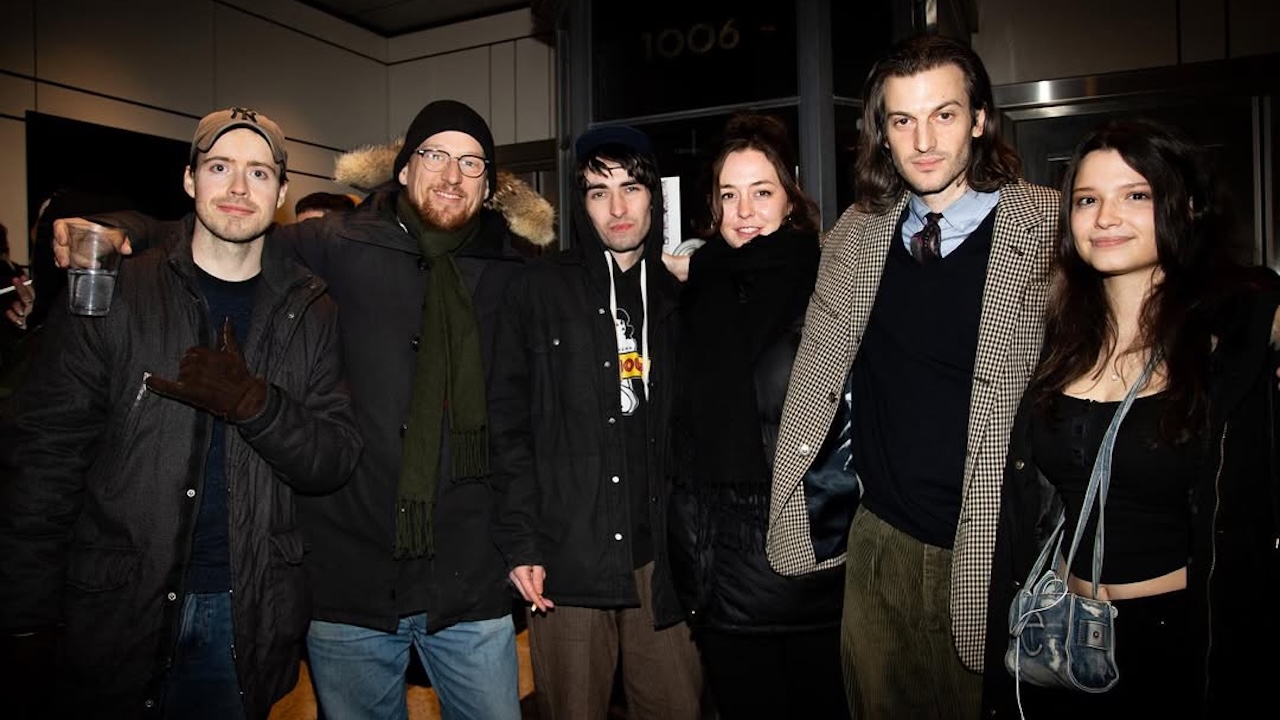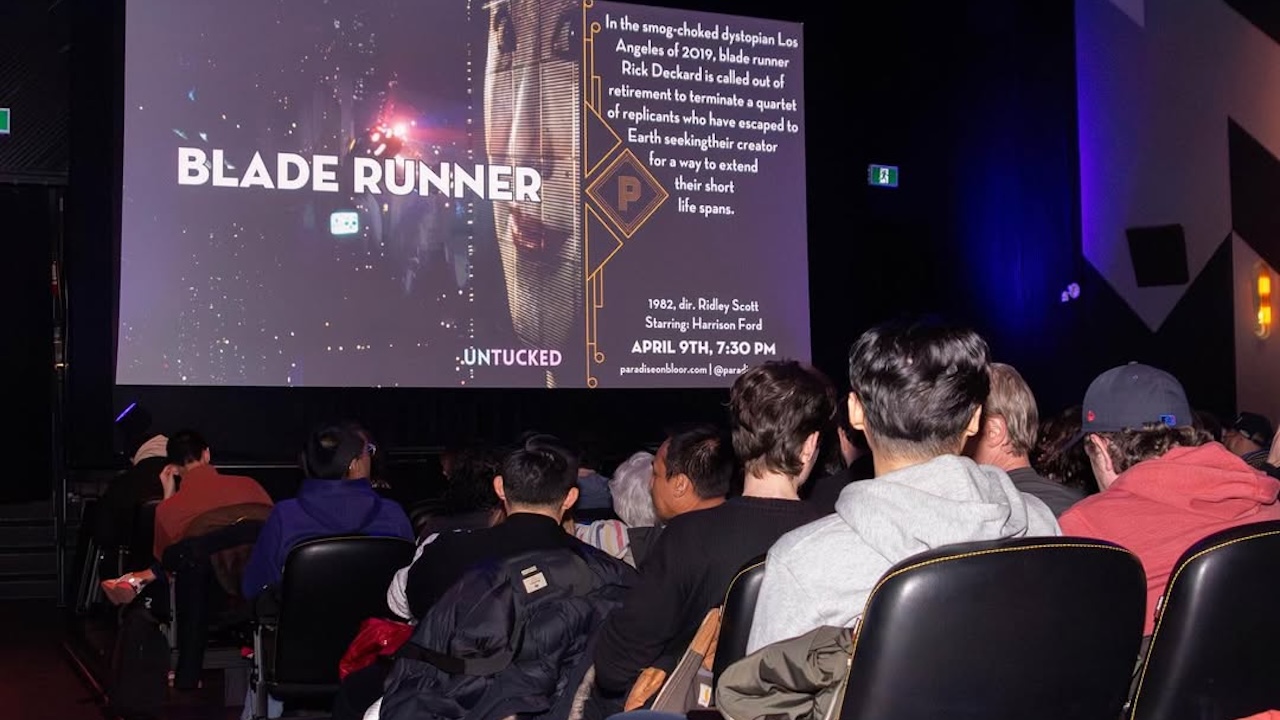A pilot at The Pilot. Ignore the tweeness of this sentence; this is the origin of Bleeding Edge film collective. Co-founded by Ethan Vestby and Alan Jones, Bleeding Edge was born out of a need to fill a gap in Toronto’s film landscape.
During the summer of 2022, as people tentatively re-entered society, Vestby and Jones noticed that, “things seemed pretty dour for movie stuff at the time,” Jones says. “It became apparent The Royal was not going to come back as the theatre.” (The Royal now mostly hosts touring comedians and podcast live shows; only on rare occasions will there be a movie screening.)
To combat this cloistered environment, Vestby and Jones decided to host a one-off screening of shorts by local filmmakers. Thankfully, friend and fellow local filmmaker Rebeccah Love’s uncle owns The Pilot in Yorkville.
“I remember sitting on the 63 bus down Ossington to get to the subway, sitting there that July evening with my laptop on my lap and being like, ‘What if nobody comes to this?’” Jones recalls.
Any fears they had before the event dissipated once it was over, with bar staff coming up to them with gratitude for the service their screening had produced. “When that was a success, it was like, ‘Heck, let’s do it again!’”
This weekend, Bleeding Edge is hosting their second annual festival, coinciding with their third birthday. There’s an Opening Night party at the Houndstooth on the Aug. 21, followed by screenings on both the Aug. 22 and 23 at Paradise Theatre. Returning to Bleeding Edge programming is filmmaker Tucker Bennett with the world premiere of his new feature In the Glow of Darkness; a screening of Bennett’s film Planet Heaven was Bleeding Edge’s second-ever event. Vestby describes this year’s selection of films as “risky”, which is a funny word as Bleeding Edge is built on risky, or at least less universally palatable films.
“There’s a similar set of frustration that if you’re not making something that’s sort of polished, or within the sort of institutional framework of the university film programs or the Canadian Film Centre, that sending movies to film festivals often seems like they’re sending them into a black hole. You don’t know if anybody’s watching them; you’re paying money for submission fees,” Jones says about the types of filmmakers Bleeding Edge supports.
The risk Vestby mentions has less to do with the content of the films, but more so that they’re giving opportunities to those who don’t have cult followings on the Internet, like Peter Vack or Caveh Zahedi. Screenings earlier this year were an easier sell, not because the films are necessarily safer (Vack’s Rachel Ormont has unsimulated sex) but because “they have a built-in audience,” Vestby notes.

Vestby, though, argues that, “Audiences here are actually a lot more curious and adventurous than we give them credit for. I think most people are tired of seeing the same s**t over and over again.”
Distribution is increasingly more difficult to secure, regardless of whether you’re an independent filmmaker cutting your teeth or a tested auteur who can rake it in at the box office while still making art that has something to say. Look no further than the mishandling of Spike Lee’s latest film Highest 2 Lowest, which only has a two-week theatrical release before being dumped onto AppleTV. And this is a film starring Denzel Washington. Bleeding Edge provides variety, opportunity and community in the streaming era.
Looking past this weekend’s festival, Bleeding Edge (in partnership with Sleaze Factory, the series curated by programmer Weird Alice) is hosting the Toronto premiere of Louise Weard’s Castration Movie: Part I, an acclaimed film follows a trans sex worker living in Vancouver, on Aug. 29. (“It’s f**king amazing,” Vestby says.) Later, on Sept. 24, they’re screening Room Temperature, Dennis Cooper’s latest, co-directed with artist Zac Farley, centering on a family who turns their home into a haunted house, only for their own personal foibles to take over. With these types of screenings, carefully curated and original, Vestby and Jones have become trusted members of Toronto’s film community.
“Community is really important because I think people do want to support their friends and they do want to support new artists,” Vestby says. Here, though, support extends past just showing up for screenings for people you know in real life, or attending parties with other Letterboxd power users. Filmmakers use Bleeding Edge gatherings not to size up rivals, but instead to find collaborators. If you read the credits of the films made by local directors screened by the collective, you’ll notice a lot of overlap; the Venn diagram of names looks more like a circle than the Ontario Science Centre logo.
A common theme I find among artists in Toronto is the imbalance between affordability and creative pursuits.
“I remember being in the sauna room at the gym and hearing some middle-aged guy talk about how in the 80s, he lived in a Little Portugal apartment with 10 other struggling artists, and he’s like ‘We were able to live there for 20 years.’” Vestby doubts you could do the same thing in Toronto now. (I personally do not know a single creative person living in this city who isn’t working multiple jobs.) Before Vestby began freelancing in film, he was working in insurance (“I think I had quiet quit for two straight years, basically.”). Jones was a journalist before he learned to code six years ago; he works in web development while also filmmaking (one of Jones’s shorts was in the first Bleeding Edge screening back at The Pilot).
“It’s not fun trying to make a living while following your passions, which is why I ended up in software,” Jones says. “We don’t make a lot of money doing the Bleeding stuff.”
Near the end of our conversation, I ask Vestby and Jones what changes to the industry would be helpful to filmmakers and programmers like themselves. Some of these issues are too structural and pervasive to be isolated into a simple problem-solution dichotomy.
“Ethan and I are both old enough to remember when the media landscape in Toronto was a lot different. There were a whole bunch of websites that covered local arts and culture stuff.” Jones says. “All the alt-weeklies are gone. The Torontoist isn’t there anymore. That stuff has been replaced by Six Buzz and Narcity, which are not places that are going to cover Bleeding Edge. It is kind of tough to figure out where to go to sort of get the word out there.”
“The financial incentives when you have a website is just to make the product cheaper, make it more broad-ranging to appeal to more people, and it’s a race to the bottom.” Jones says. “It’s kind of hard to stand out unless you’re willing to just forego an expectation of growth or increased profitability, which is not how businesses usually work, unfortunately.”
Vestby, on the other hand, has a good recommendation. “We need to encourage more rich people to have good taste. Maybe it’s a lost cause for older rich people, but their kids. From five on, show them Goddard.”
“We need these private school kids.” Jones quips. “Instead of telling them just to come to the shows, also tell them to finance the movies.”


